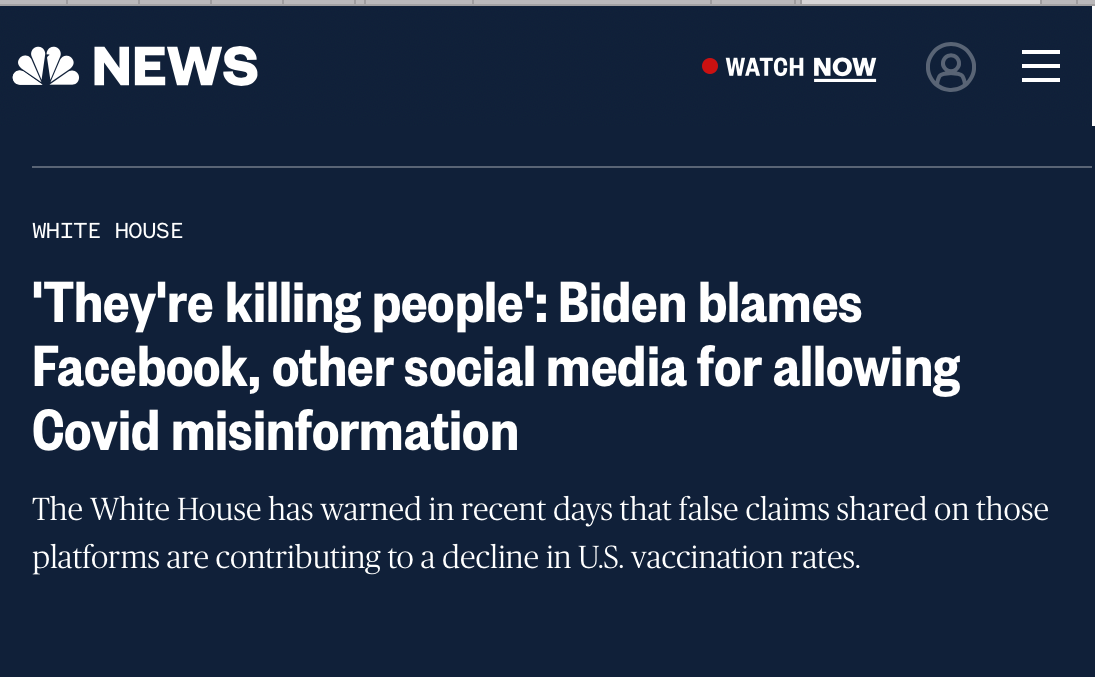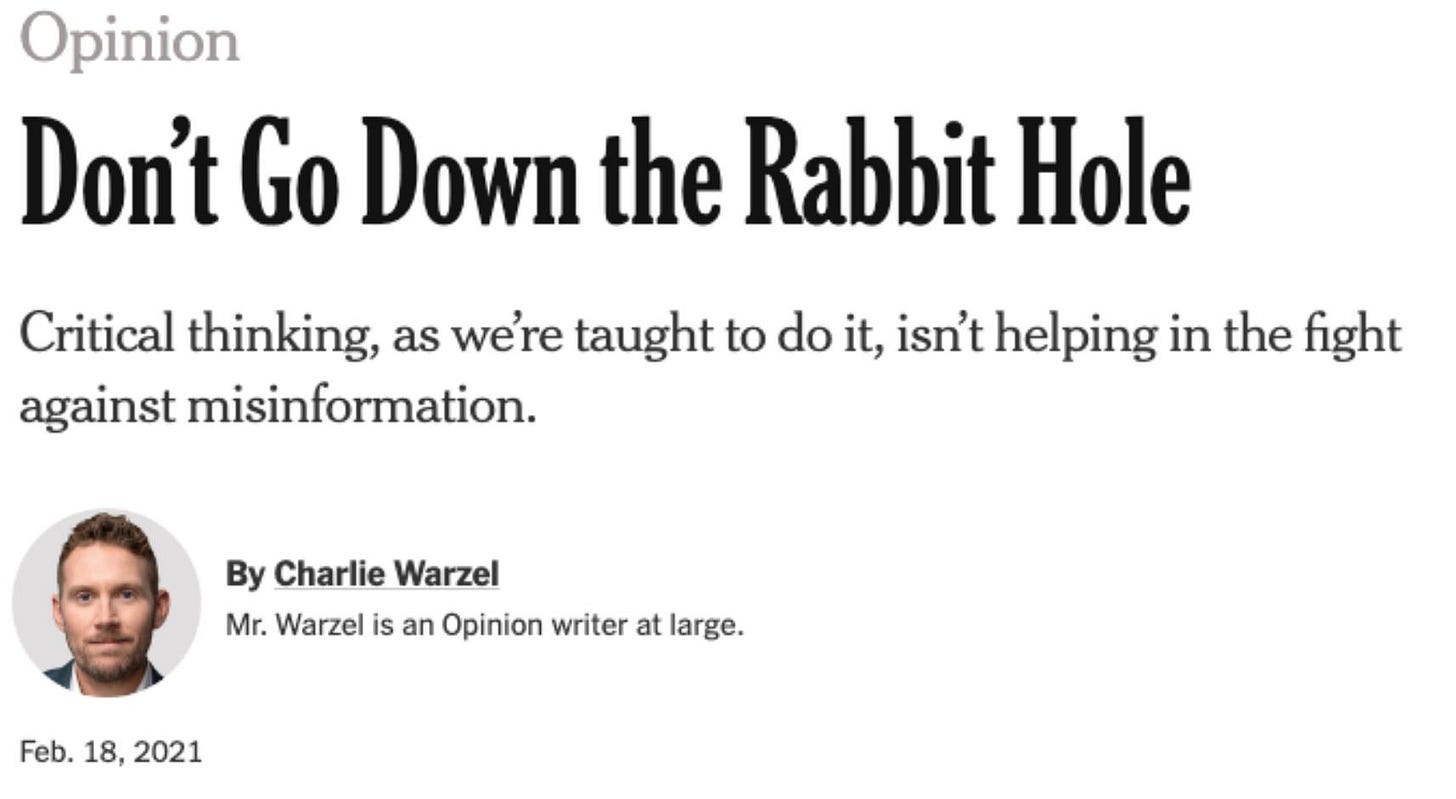The War on Inconvenient Truth
How Truth and Public Discourse are the Biggest Casualties in the War Against Misinformation
“It’s amazing how much panic one honest man can spread among a multitude of hypocrites.”
― Thomas Sowell
Independent thinkers, particularly the vocal ones, have become a real nuisance for World Economic Forum members who have some big plans for us. The Great Reset, WEF’s initiative to “build a new social contract to honor the dignity of every human being,” could be up and running by now, with digital passports and annual boosters for all, if only people would stop asking inconvenient questions and demanding bodily autonomy.
https://www.forbes.com/sites/worldeconomicforum/2016/11/10/shopping-i-cant-really-remember-what-that-is-or-how-differently-well-live-in-2030/
During the COVID-19 crisis the WEF saw “a unique window of opportunity.” It was all hands on deck as global leaders recruited the cooperation of local government, mainstream media, the medical establishment, scientists, academia, social media platforms and regulatory authorities to quash dissent and any inconvenient truth that might interfere with “the greater good.” And no expense was spared.
Apparently, they were anticipating this. In 2017, Johns Hopkins Center for Health Security published The SPARS Pandemic: A Futuristic Scenario for Public Health Risk Communications, to highlight “communication dilemmas concerning medical countermeasures (MCMs) that could plausibly emerge in the not-so-distant future.”
The narrative is eerily familiar. But somehow, rather than preventing the described scenarios, these agencies performed them. And, as predicted, many resisted.
“Building vaccine confidence” became a multi-billion dollar effort. Center for Health Security research supported this endeavor since “a public health effort that reduced or effectively countered misinformation and disinformation and was able to reduce related nonvaccination by 10% would be worth between $5 and $30 million per day, or between $150 and $900 million per month, while the pandemic continues.”
Building confidence quickly became fighting “vaccine hesitancy.” And when incessant propaganda from regulatory agencies and health departments failed to convince the hesitant, these same agencies initiated a war on “misinformation.”
In April of 2020, Cornell University’s Alliance for Science offered up COVID: Top 10 Conspiracy Theories to help identify some of the dangerous misinformation that threatened to lead the public astray. Among them were theories that the virus had escaped from a Chinese lab, that the virus was created as a bioweapon, and that Covid death numbers had been inflated. These and other theories have been revisited and validated over the course of the pandemic.
Meanwhile, in a country founded on freedom, the White House has endorsed surveillance and censorship as the Biden administration takes an active role in identifying and recommending the removal of “problematic” Meta (formerly Facebook) posts that contain what it deems “misinformation” about Covid-19. People now regularly find themselves in “Facebook jail” for posting studies that support the use of ivermectin or articles that address the failings of mask mandates. Dissenting voices, including senators and mRNA vaccine developers, have been subject to both ad hominem attacks and permanent removal from social media platforms.
Even more concerning is the silencing of doctors, who now put their careers and licenses at risk when they speak outside the accepted narrative. Last year, the Federation of State Medical Boards released a statement asserting that “physicians who generate and spread COVID-19 vaccine misinformation or disinformation are risking disciplinary action by state medical boards, including the suspension or revocation of their medical license.” Currently, anything that opposes the current “safe and effective” narrative employed by the CDC and other regulatory authorities is considered misinformation despite much scientific evidence to the contrary.
Sadly, seeing how others are mocked and vilified for asking inconvenient questions and offering alternative perspectives, many are discouraged from engaging at all. Respectful discourse is on life support. The controversy that ensued following Joe Rogan’s interviews with Dr. Peter McCullough and Dr. Robert Malone put a spotlight on our intolerance of any alternative perspective that might interfere with the comfort of certainty.
The World Health Organization (WHO) and other regulatory agencies actually seem more interested in exploring underlying conditions that lead to “infodemics” than exploring the vulnerabilities associated with the Covid-19 pandemic. Much of their focus has been on messaging campaigns designed to impact behavioral change.
Efforts to promote vaccine confidence and increase vaccination compliance have been ongoing for many years, but the WHO took it to a new level when it declared vaccine hesitancy one of the top 10 global public health threats of 2019.
That same year, Rep. Adam Schiff (D-CA), called on social media companies to de-platform what he deemed “vaccine misinformation.” From there, the war on “misinformation” quickly kicked into high gear, permeating local health boards, classrooms and other community settings throughout the country.
What are the primary weapons for a war on misinformation? Semantics and censorship.
In preparation for this war, the WHO has changed the very definitions of critical terms like pandemic, herd immunity and causality to accommodate public health agendas. Under the new definitions, “enormous numbers of deaths and illness” are no longer required to declare a pandemic, herd immunity can only be achieved via vaccination and it is virtually impossible to attribute causality to adverse events that occur after vaccinations.
Merriam-Webster has also lent a hand to settled “science” by changing the very definition of science to “the state of knowing: knowledge as distinguished from ignorance or misunderstanding.” And, thanks to Merriam-Webster, you can now be dubbed an “antivaxxer” for simply voicing opposition to vaccination mandates, even if you are fully vaccinated according to the CDC schedule.
Furthermore, the WHO and others are expanding the vocabulary around vaccine discourse. We now have misinformation, disinformation (misinformation with malintent) and infodemics. According to the WHO, an infodemic is “an overabundance of information, both online and offline.
It includes deliberate attempts to disseminate wrong information to undermine the public health response and advance alternative agendas of groups or individuals” and the organization hosted several infodemiology conferences throughout the pandemic.
Asserting that “misinformation costs lives,” these groups have created the perfect justification for the suppression of dissent. Last May, the WHO created a resolution asking member states to take measures to leverage digital technologies to counter mis- and disinformation and has been working with over 50 digital companies and social media platforms, including TikTok and even Tinder, to support these efforts.
Last January, the Biden Administration called for for an “unprecedented vaccination public health campaign” in the United States. Since then every media outlet has been flooded with messaging to promote the “safe and effective” Covid-19 shot while alternative perspectives and inconvenient findings are debunked, canceled or silenced.
A month later, New York Times writer Charlie Warzel warned us about the dangers of critical thinking and advised readers to trust the experts and authoritative sources (like him) when it comes to complicated sciency things like COVID-19.
Organizations like ShotsHeard.org and Stronger.org encourage people to block and report “anti-science, anti-vaxx terrorists” while others like the Center for Countering Digital Hate has demanded that Facebook and Twitter remove the accounts of those they accuse of spreading disinformation, prompting the removal of accounts of Robert F. Kennedy Jr., Dr. Joseph Mercola, Ty and Charlene Bollinger, Sayer Ji and others from social media platforms.
And other prominent voices vanish from social media every day.
What constitutes “misinformation?”
Apparently anything that steps outside of state-sanctioned consensus. In 2012, the National Defense Authorization Act (NDAA) included an amendment that legalized the use of propaganda on the American public making it much easier for governments to create self-serving narratives. While the CDC, public health departments and mainstream media can make broad assertions like “COVID-19 vaccines were developed quickly while maintaining the highest safety standard possible” and “Hydroxychloroquine shouldn't be used to treat COVID-19” and claim they are “fact,” articles and posts that challenge those assertions are regularly removed (if they’re even permitted to be published in the first place).
Even peer-reviewed science or data from CDC sources can land Facebook and Twitter users on the wrong side of community guidelines leading to restricted or deleted accounts. And now we’re learning that the CDC has been withholding COVID-19 data over fears that the public might misinterpret it.
Fact-checkers, like Politifact, regularly appear to claim articles are false or misleading, or accuse posters of failing to provide context. Often, the articles they provide to “debunk” posts offer straw man arguments that do not address legitimate assertions or concerns.
Unfortunately, if you begin with the premise that all vaccines are safe and effective and that sharing any information that leads to vaccine hesitancy is dangerous misinformation, there is little room for discourse.
And that is where we are.
But we can’t afford to stop asking questions. In the current climate, inquiring minds will have to look beyond scientific consensus and outside the narrative perpetuated by mainstream sources to piece together the truth.
As always, our best bets are scientific pursuits driven by curiosity and the thoughtful exchange of ideas between individuals. It’s time to root back into our own hearts, minds and communities.







